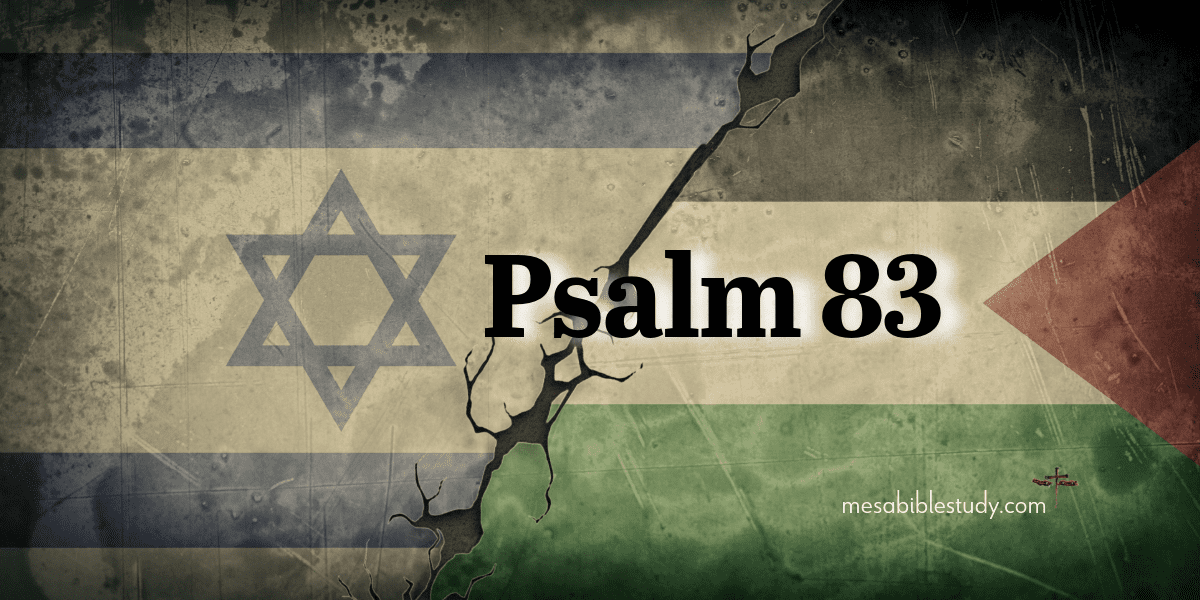Introduction: Historical and Prophetic Background of Psalm 83
- Author: Asaph (Levite, prophet, and worship leader under King David)
- Date Written: ~1000–950 BC
- Audience: The nation of Israel
- Purpose: A national plea for divine intervention against a hostile alliance
Psalm 83 is the final song in the collection attributed to Asaph (Psalms 73–83). It captures a time when Israel faced the threat of annihilation by a confederation of neighboring enemies. While there is no historical record of all ten listed nations uniting in one war, the psalm reflects the ongoing, surrounding hostility Israel endured during the early monarchy—and may prophetically speak to a future attempt to erase Israel from existence.
This psalm is not only a prayer for deliverance but also a prophetic foreshadowing of end-time opposition against Israel, reminding readers:
“That they may know that You, whose name alone is the Lord, Are the Most High over all the earth.” (Psalm 83:18)
Psalm 83: A Timeless Warning Against the Enemies of Israel
Psalm 83 is not merely a historical lament—it is an eternal warning. It was true in Asaph’s day (3000 years ago), and it’s still true now. This psalm reveals Satan’s relentless strategy: eliminate Israel to thwart God’s promises. No Israel, no King. No King, no Kingdom. That’s the aim behind every alliance, resolution, protest, or policy that seeks to weaken or erase the Jewish nation. The confederacy of nations listed in Psalm 83—Edom, Moab, Ammon, Philistia, and others—may have ancient names, but their modern counterparts are very much alive and conspiring today. These enemies haven’t disappeared; they’ve simply rebranded.
We are witnessing Psalm 83 in real time. Arab nations and global powers are once again gathering behind closed doors, scheming under the banner of “peace” or “justice” for Gaza—but their true aim is Israel’s isolation and destruction. The war in Gaza has become the excuse, the smoke screen. Headlines today echo the ancient cry: “Come, and let us cut them off from being a nation.” The pressure against Israel is global. The United Nations. The European Union. Iran. Russia. And yes, even our beloved America—once a faithful ally—is now wavering. But God is not silent, and Psalm 83 reminds us that He will have the final word.
Ancient Enemies, Modern Counterparts and a Close Allie
Psalm 83 describes a confederation of nations plotting to “cut off Israel from being a nation.” Though this has never happened in history exactly as described, we may be witnessing the early stages of this prophecy unfolding today.
Here’s how the nations listed in Psalm 83 correspond to modern-day locations and their relevance:
| Psalm 83 Nation | Modern Equivalent | Current Relevance |
| Edom | Southern Jordan | Jordan maintains a fragile peace with Israel; tensions persist. |
| Ishmaelites | Arab tribes (Saudi Arabia) | Warming ties with Israel, but underlying religious hostility remains. |
| Moab | Central Jordan | Jordan’s population includes many Palestinians; still a source of tension. |
| Hagrites | Northern Saudi Arabia | Historically hostile; region symbolic of early Arab opposition. |
| Gebal | Lebanon (southern coastal region) | Hezbollah stronghold—openly anti-Israel. |
| Ammon | Northern Jordan | Diplomatic ties, but Jordan’s role in Arab alliances keeps pressure on Israel. |
| Amalek | Southern Israel / Sinai / Negev area | Symbolic of long-standing spiritual enmity toward Israel. |
| Philistia | Gaza Strip (Palestinians) | Ruled by Hamas—actively seeks Israel’s destruction. |
| Tyre | Lebanon (modern-day Hezbollah territory) | Tyre was a wealthy city; now part of Hezbollah’s terror network. |
| Assyria | Syria and parts of Iraq | Syrian regime and Iranian-backed militias threaten northern Israel. |
A Call to Prayer and Watchfulness
Now is the time for the Body of Christ to be sober and watchful. We must not remain silent as the world gathers against Israel. If Psalm 83 teaches us anything, it’s that God is not indifferent to the schemes of the nations—He sees, He hears, and in His perfect time, He acts. So we pray: not in fear, but in faith. Pray for the peace of Jerusalem (Psalm 122:6). Pray for Israel’s protection. And pray that many—Jew and Gentile alike—come to salvation through Jesus Christ, the Messiah.
Let us also take heart in this truth:
“Behold, He who keeps Israel shall neither slumber nor sleep.” (Psalm 121:4)
And to Gentile believers, Romans 11:16–24 serves as both a reminder and a warning. We are not the root—we are grafted in, partakers of the rich blessings of the olive tree only because of God’s faithfulness to His covenant with Israel. Paul urges us not to boast against the natural branches, for it is not we who support the root, but the root that supports us. This should produce in us gratitude and humility, not pride. The blessings we enjoy under grace flow through the promises God made to Abraham, Isaac, and Jacob.
‘do not boast against the branches. But if you do boast, remember that you do not support the root, but the root supports you.’
Romans 11:18
So as we see the nations gather once again against Israel, let us pray with urgency, stand with boldness, and rest in the assurance that the God who keeps Israel never sleeps. And neither do His promises.

0 Comments